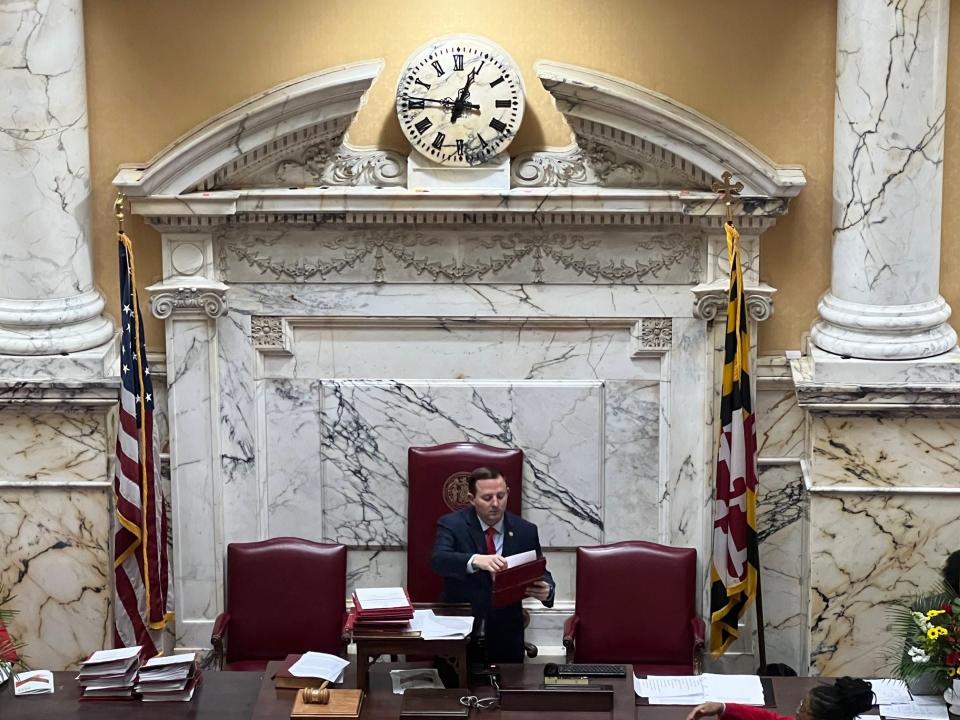Maryland Gov. Moore vetoes four bills to end legislative period. Here they are.
- Oops!Something went wrong.Please try again later.
After months of hearings, votes and bill signings, Maryland’s 2024 legislative session concluded with four vetoes from the governor, who signed 1,000-plus bills and let two bills go into effect without his signature this year.
Maryland Gov. Wes Moore, a Democrat, sent letters this month to Speaker of the House of Delegates Adrienne Jones, D-Baltimore County, and Senate President Bill Ferguson, D-Baltimore, informing the legislative leaders of his veto decisions.
“In accordance with Article II, Section 17 of the Maryland Constitution, I have vetoed Senate Bill 380 — Police Recruitment and Retention Workgroup” Moore wrote to Ferguson in the first sentence of one veto letter, a line similar to one that led three other letters to the legislators.

Moore cited the Growing Apprenticeships and the Public Safety Workforce Act, or GAPS Act, which the administration introduced and that he signed into law on May 16, as the reason for the Senate Bill 380 veto.
“It is not necessary to create two workgroups designed to address the same problem,” the two-paragraph letter said.
More: Maryland Gov. Moore signs hundreds of bills, including budget, public safety measures
With veto, governor allows only Maryland-licensed dealers of RVs at shows
A similar duplicative purpose was stated in a short veto letter of Senate Bill 693, which authorized the Carroll County Commissioners to issue up to $29.8 million in public facility bonds. The General Assembly passed a similar House Bill that was signed by Moore, who vetoed the Senate version in order to not authorize twice the amount indicated by the bill.
A longer letter was sent to Ferguson to indicate the reasons for the veto of Senate Bill 60, legislation sponsored by state Sen. Mary Beth Carozza, R-Worcester/Wicomico/Somerset, which would have allowed the temporary authorization of out-of-state dealers of Recreational Vehicles, or RVs, to participate in Maryland RV shows.
“While well-intentioned to boost the economy in Ocean City during the Fall season, the impact of this bill would have been to give out-of-state vendors access to Maryland's market without affording that same opportunity to Maryland dealers in other states,” the letter said.
Moore continued: “As the Governor of Maryland, my focus is on ensuring that Maryland businesses and employees can thrive in an equitable marketplace.”
“After extensive review, I have concluded that this bill stands to create inequities for Maryland RV dealers that would result in losses,” he said. In the letter, Moore referenced legislation that he signed, House Bill 383, which creates an interstate cosmetology licensure compact, as an example of a “balanced approach” that could guide future legislation impacting Recreational Vehicle dealers.
More: 'We knew it was an issue that could not wait': Moore signs multiple housing bills into law
Bill vetoed that would have moved estate notices to government website
A veto letter of a similar length was sent to House Speaker Jones regarding House Bill 1258, which would have consolidated estate notices away from local publications and into a central government website.
In the letter, Moore noted the bill sponsor’s aim in addressing the fee of estate notices to families and local governments, calling the cost issue “an important concern.”
“However, there is also a vital public interest in ensuring the existence of thriving independent local media,” he said. “As I believe that a broader conversation is necessary and that a hasty transition in public notice requirements should be avoided, I have vetoed House Bill 1258.”
The veto messages now are set to be considered at the next session of the legislature, which is not scheduled to return until Jan. 8, 2025. A three-fifths vote of the General Assembly is necessary to override a veto.
More: Estate notices, key income source for newspapers, may go to state in pending Maryland bill

Two bills — one from the House and one from the Senate and both related to the medical field — passed into law without Moore’s signature, as he explained in a letter to the legislative leaders.
In 2023, Moore’s first year in office, 10 bills became law without his signature and three were vetoed.
Dwight A. Weingarten is an investigative reporter, covering the Maryland State House and state issues. He can be reached at dweingarten@gannett.com or on Twitter at @DwightWeingart2.
This article originally appeared on Salisbury Daily Times: Maryland Gov. Moore vetoes four bills to end legislative period

